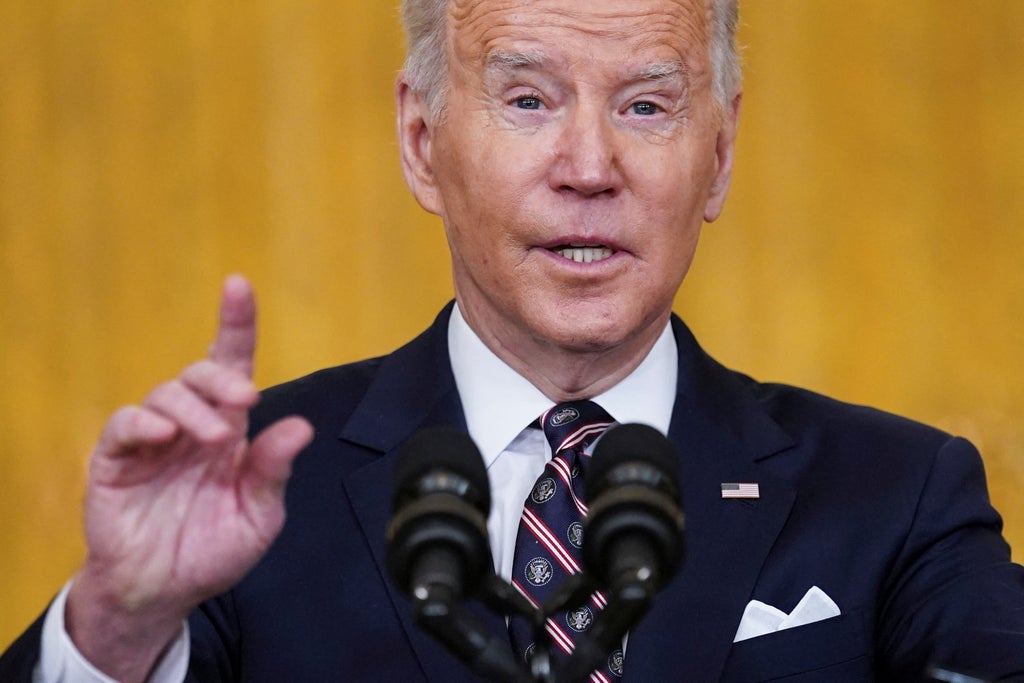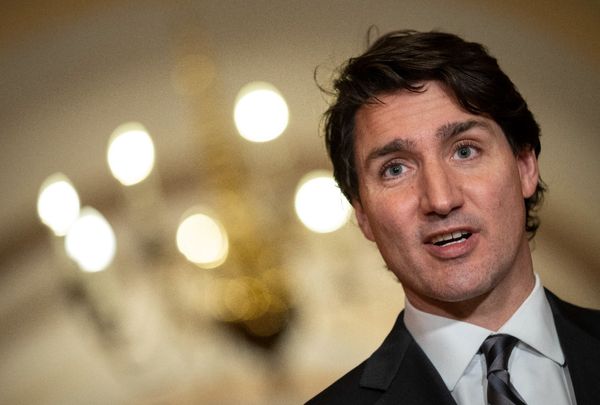
President Joe Biden said the United States would levy a “first tranche” of sanctions on two large Russian banks and “comprehensive sanctions” against Russia’s sovereign debt in response to its invasion of Ukraine, calling it “a flagrant violation of international law”.
Specifically, Mr Biden announced on Tuesday that the US was imposing sanctions against VEB.RF – formerly known as Vnesheconombank – and Russia’s “military bank”.
The administration is “blocking” both institutions, which freezes their assets in the US and prevents them from conducting any transactions with the US or Europe.
The sanctions against Russian sovereign debt, he said, would “cut off Russia's government from Western financing” so Moscow could no longer raise capital from the West, nor trade new debt in US or European markets.
Mr Biden also said the US would begin levying more sanctions against “Russian elites and their family members” starting on Wednesday, and “continuing in the days ahead”.
“They share in the corrupt gains of the Kremlin’s policies and should share in the pain as well,” he said. He added that the US sanctions were “closely coordinated” with US allies, and would “continue to escalate” if Russia continues on its current path. He also noted that the Russo-German Nord Stream 2 gas pipeline would not go forward “because of Russia’s actions”.
The new sanctions were imposed in response to Russian president Vladimir Putin’s declaration that he would recognise so-called “people’s republics” in Donetsk and Luhansk – where Russian-backed separatists have been fighting Ukrainian forces since 2014 – and Mr Putin’s decision to send Russian troops over Ukraine’s border to assist the separatists.
Shortly after Mr Biden spoke about the new sanctions and troop deployments, US Secretary of State Antony Blinken announced he would not go forward with a previously agreed-upon meeting with his Russian counterpart, foreign minister Sergei Lavrov.
Speaking at a joint press conference alongside Ukrainian Foreign Minister Dmytro Kuleba, Mr Blinken said it “does not make sense to go forward” with the meeting because Russia had “made clear its wholesale rejection of diplomacy” by invading Ukraine.
“The United States and I personally remain committed to diplomacy of Russia is prepared to take demonstrable steps to provide the international community with any degree of confidence that it's serious about the escalating and finding a diplomatic solution,” Mr Blinken said. “But we will not allow Russia to claim the pretense of diplomacy. At the same time it accelerates it's marched down the path of conflict and war”.
For his part, Mr Kuleba commended Mr Blinken’s “immense efforts” to “mobilise the global coalition of allies and partners to stop Russia” and praised Mr Biden for taking “swift action” in imposing the sanctions. He also said it was “encouraging” to hear that the US would continue to escalate sanctions in response to continued Russian aggression, calling such a tit-for-tat strategy “exactly the rule that has to be followed”.
A senior administration official who briefed reporters on details of Tuesday’s actions called the speed at which sanctions had been levied and the level of coordination with allies in imposing them “historic”.
“We announced our first tranche of sanctions in less than a day with allies and partners from the European Union, the United Kingdom, Canada, Japan and Australia. This response was taken much faster and goes much further than what we did in 2014,” he said.
The official noted that VEB.RF is Russia’s fifth-largest financial firm and called it “a glorified piggy bank for the Kremlin that holds more than $50bn in assets”. He also explained that the sanctions against Russia’s “military bank” would affect a $35bn institution “that finances the activities of the Russian military”.
He added that other more prominent Russian banks could be targeted with more sanctions if the Kremlin continues aggressive actions.
“Let me be totally clear: no Russian financial institution is safe if this invasion proceeds — we are ready to press a button to take further action on the very largest Russian financial institutions,” he said, adding that the US was prepared to impose the same sanctions against Sberbank and VTB Bank — formerly known as Vneshtorgbank — which would affect roughly $750bn in assets, or more than half of Russia’s bank holdings.
Turning to the sanctions Mr Biden had announced on “Russian elites and their family members,” he said the individuals affected include FSB director Alexander Bortnikov and his son, VTB chairman Denis Bortnikov, as well as First Deputy Presidential Chief of Staff Sergey Kiriyenko, his son Vladimir Kiriyenko — the CEO of Russian technology company VK — and Promsvyazbank CEO Pyotr Fradkov, son of former Russian prime minister and foreign intelligence chief Mikhail Fradkov.
The official said others in Mr Putin’s circle should be “on notice” that the US and its allies could take “additional actions” against them as well, and said “all options” remain on the table if Russia continues its aggression, including sanctions against Mr Putin himself.
Additionally, he said the US is “fully prepared” to join “a very large number of countries across the world” in imposing strict export controls that would deny Russia “critical technology inputs” needed to diversify and modernise its economy, should Russia’s invasion proceed.
The official also noted that the end of the Nord Stream 2 pipeline means the $11bn Russia has put into the construction “will now go to waste” as a “sacrifice” of “what would have been a cash cow for Russia's financial coffers” that “will relieve Russia's geostrategic chokehold over Europe through its supply of natural gas”.
“It's a major turning point in the world's energy independence from Russia,” he said, calling Tuesday’s actions “only the sharp edge of the pain we can inflict” upon Russia.
Mr Biden’s remarks came hours after his deputy national security adviser, Jon Finer, told CNN that the Russian troop presence in eastern Ukraine constituted an “invasion” and a day after a senior administration official promised “further measures” beyond the limited sanctions imposed under a Monday executive order which narrowly targeted activities within the Donetsk and Luhansk regions.
Mr Biden said he fully expects a Russian response, and said the US will have its “next move” prepared as Russia contemplates its own.
“Russia will pay an even steeper price [for] continued aggression, including additional sanctions,” he said, adding later that his administration will use “every tool” it has to protect American businesses and consumers from any negative effects from the sanctions, particularly higher prices for oil and petrol.
“Defending freedom will have cost for us as well here at home – we need to be honest about that. But as we do this, I'm going to take robust action to make sure the pain of our sanctions is targeted at a Russian economy, not ours,” he said.
Mr Biden also said the US still believes Russia “is poised to go much further in launching a massive military attack against Ukraine”.
“I hope we’re wrong about that, but Russia ... has only escalated this threat against the rest of Ukrainian territory, including major cities including the capital city of Kiev,” he said.
In response to Russia’s announcement that it would not withdraw forces that have been deployed to Belarus for purported military exercises, Mr Biden said he had authorised “additional movements of US forces and equipment already stationed in Europe” to shore up defences in Latvia, Lithuania, and Estonia. All three Baltic states are – like Ukraine – former Soviet republics, but unlike Ukraine, are Nato members.
While he described the moves as “totally defensive” and stressed that the US and Nato “have no intention of fighting Russia,” he also said the troop movements were meant to send Russia the “unmistakable message” that America and her allies “will defend every inch of Nato territory and abide by the commitments we made to Nato”.







